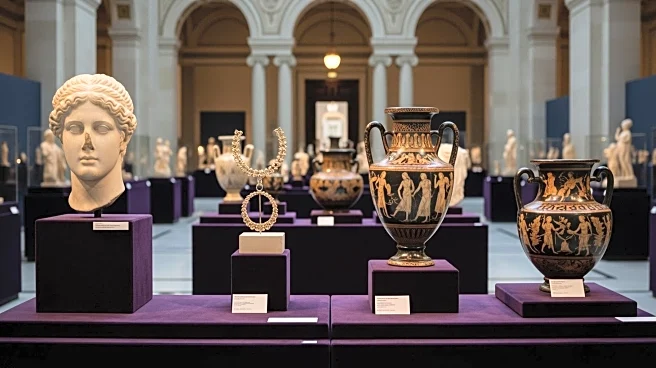What's Happening?
The Manhattan District Attorney's office, led by Alvin Bragg, has successfully repatriated 29 antiquities valued at $3 million to Greece. These artefacts were part of trafficking networks involving smugglers
Robin Symes and Eugene Alexander. Symes, a British art dealer, was identified as a key figure in an international looting syndicate following a 2016 investigation by Italy's Carabinieri. The repatriation ceremony took place at the Consulate General of Greece in New York. Among the notable items returned is a sculpture known as 'Bronze Foot in the Form of a Sphinx,' seized from the Metropolitan Museum of Art. Another significant piece is a bronze applique depicting a gorgon, originally attached to a bronze vessel, which was sold by trafficker Robert Hecht to Fortuna Fine Arts. The Manhattan District Attorney's Antiquities Trafficking Unit has been instrumental in recovering nearly 2,400 artefacts from 47 countries since Bragg took office in 2022.
Why It's Important?
The repatriation of these antiquities underscores the ongoing efforts to combat illicit trafficking of cultural heritage, a matter linked to organized crime and terrorism. The successful return of these artefacts highlights the collaboration between international authorities to preserve cultural heritage and deter illegal activities. For Greece, this event is a significant victory in its policy against cultural heritage trafficking, enhancing its reputation as a leader in this global fight. The actions of the Manhattan District Attorney's office not only restore stolen cultural assets to their rightful owners but also serve as a deterrent to future trafficking operations, reinforcing the importance of international cooperation in cultural preservation.
What's Next?
The Manhattan District Attorney's office is expected to continue its efforts in recovering and repatriating stolen artefacts. This ongoing initiative may lead to further collaborations with international partners to address the broader issue of cultural heritage trafficking. The Antiquities Trafficking Unit's work could inspire similar actions by other jurisdictions, potentially leading to more comprehensive global strategies to combat the illegal trade of cultural artefacts. Additionally, the digital Museum of Looted Antiquities aims to document these repatriations and expose smuggling networks, contributing to public awareness and education on the importance of cultural heritage preservation.
Beyond the Headlines
The repatriation of these antiquities may have deeper implications for the art world, particularly in terms of ethical collecting practices and the responsibilities of museums and private collectors. This event could prompt institutions to reassess their acquisition policies and provenance research, ensuring that artefacts are obtained legally and ethically. Furthermore, the focus on cultural heritage trafficking may lead to increased scrutiny and regulation within the art market, potentially affecting the dynamics of art trade and collection.












